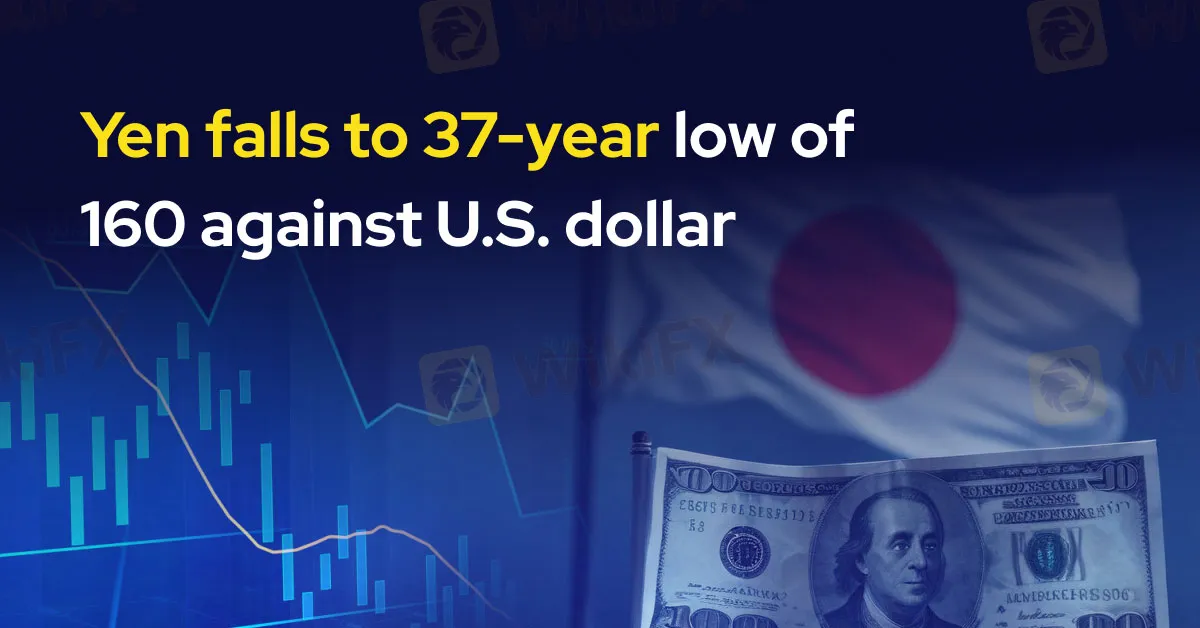简体中文
繁體中文
English
Pусский
日本語
ภาษาไทย
Tiếng Việt
Bahasa Indonesia
Español
हिन्दी
Filippiiniläinen
Français
Deutsch
Português
Türkçe
한국어
العربية
Yen falls to 37-year low of 160 against the U.S. dollar
Abstract:The Japanese yen plummeted below 160 against the US dollar on Wednesday, marking its weakest position in over 37 years. The steep decline has sent shockwaves through Tokyo, prompting urgent discussions on intervention strategies to stabilize the currency.

The Japanese yen plummeted below 160 against the US dollar on Wednesday, marking its weakest position in over 37 years. The steep decline has sent shockwaves through Tokyo, prompting urgent discussions on intervention strategies to stabilize the currency.
The yen's descent below the critical 160 threshold occurred amidst heightened concerns raised by Japanese and South Korean economic forecasters earlier this week. The situation escalated further after the United States added Japan to its watch list for currency manipulation, intensifying global scrutiny.
During London trading hours, the yen touched 160.39 against the dollar, a level unseen since 1986. The alarming drop triggered swift action from Japan's central bank on April 29, when the yen first breached the 160 mark, prompting immediate intervention measures.
Masato Kanda, Japan's vice finance minister, conveyed deep apprehension over the yen's rapid depreciation, emphasizing the government's vigilant monitoring of market trends and readiness to implement necessary countermeasures. “We have a serious concern about the recent rapid weakening of the yen,” Kanda stated, underscoring the urgency of the situation in remarks reported by Bloomberg.
The Japanese government has already committed substantial resources to curb the yen's freefall, spending approximately $61.3 billion in interventions between April 26 and May 29. These efforts involved selling treasuries to stabilize the currency amidst volatile market conditions.
Earlier attempts to bolster the yen, such as the Bank of Japan's first interest rate hike in 17 years in March, have not yielded the desired results. Despite these measures, the yen has continued to struggle against the strengthening US dollar, posing significant challenges for Japan's economic stability and global trade competitiveness.
As Tokyo deliberates on its next steps to address the currency's unprecedented decline, global markets remain attentive to developments that could impact broader economic landscapes. The yen's trajectory in the coming days will likely influence policy decisions in Japan and reverberate across international financial markets, underscoring the interconnected nature of global economies amidst evolving geopolitical dynamics.

Disclaimer:
The views in this article only represent the author's personal views, and do not constitute investment advice on this platform. This platform does not guarantee the accuracy, completeness and timeliness of the information in the article, and will not be liable for any loss caused by the use of or reliance on the information in the article.
Read more

TradexMarkets: 5 Troubling Signs You Shouldn’t Ignore
Stop! Read this article if you're thinking about using TradexMarkets. There are several warning signs that suggest this broker may not be safe. Check out this article to find out why. Be safe.

WeTrade Marks 10th Anniversary with Global Campaign, Upgrades and Rewards
The leading financial broker celebrates a decade of excellence with worldwide screen takeovers viewed by millions

Investment Scam Alert: FCA Identifies 15 Scam Brokers
UK Financial regulator, FCA (Financial Conduct Authority) has issued warnings against 15 forex brokers operating without proper authorization. Checkout the list below & Be Scam ALERT .

SEC Implements New Rules for Crypto-Asset Service Providers
The SEC enforces new 2025 rules and guidelines for Crypto-Asset Service Providers (CASPs) to strengthen regulation, compliance, and investor protection in the Philippines.
WikiFX Broker
Latest News
XS.com Broker Partnership Expands Liquidity with Centroid Integration
EC Markets: A Closer Look at Its Licenses
Housewife Scammed of RM68,242 in Online Investment Scam
From Charts to Profits: Unleashing the Power of Forex Trading Tools
FCA Publishes New Warning List! Check It Now to Stay Safe
Beware of Fake RS Finance: How to Spot Scams
Fortune Wave Solution: SEC Warns of Investment Scam
D. Boral Capital agrees to a fine as a settlement with FINRA
Is TD Ameritrade Safe? How to Spot Fake URLs and Stay Protected
Before You Trade with Quest: 6 Warning Signs to Know
Currency Calculator



